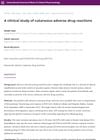Search
forLearn
1 / 1 resultsResearch
5 / 1000+ results
research Incidence of Adverse Cutaneous Drug Reactions in a Mexican Sample: An Exploratory Study on Their Association to Tumor Necrosis Factor Alpha TNF2 Allele
Mexican patients had a lower incidence of skin reactions to drugs and no significant link between these reactions and the TNF2 gene variant.

research Cutaneous Drug Reactions
Any drug can cause skin reactions, but antibiotics, NSAIDs, and psychotropic drugs are more common, with some reactions being life-threatening.

research Cutaneous Adverse Drug Reactions to Antibiotics: Extent of the Problem
Antibiotics often cause skin reactions, making them a major health concern.

research A Clinical Study of Cutaneous Adverse Drug Reactions
Skin reactions to drugs are most often rashes caused by antibiotics, with nevirapine being the most common culprit; knowing these patterns can improve treatment and outcomes.
research A Review of Adverse Cutaneous Drug Reactions Resulting from the Use of Interferon and Ribavirin
Interferon and ribavirin can cause serious skin reactions and other health issues.
Community Join
5 / 17 resultscommunity Why is everyone not directly advised Dutasteride?
Dutasteride is less commonly prescribed for hair loss because it is not FDA-approved for this purpose, unlike finasteride, which is more accessible and preferred due to fewer side effects. Dutasteride may be more effective in reducing DHT but has a longer half-life and potentially more significant side effects.
community Being Safe on Oral Minoxidil: tl;dr on the literature.
Oral minoxidil is effective for hair loss but can cause cardiovascular side effects, such as pericardial effusion, especially in those with genetic predispositions. Starting with low doses and monitoring cardiovascular health are advised to reduce risks.
community HMI-115 update: Chime Biologics and Hope Medicine Enter Manufacturing Agreement to Speed up the Launch of First-in-class Antibody Drug HMI-115 Targeting Endometriosis and Androgenic Alopecia
Chime Biologics and Hope Medicine are speeding up the launch of a first-in-class antibody drug, HMI-115, for endometriosis and androgenic alopecia. The treatment involves a series of subcutaneous injections, has shown promising results in phase 1, and continues to promote hair regrowth even after the treatment is stopped.
community A Different Take on Curing MBP
Addressing hair loss by focusing on posture, blood flow, and craniofacial development. Methods include improving posture, cardiovascular activity, scalp massages, healthy diet, meditation, using minoxidil, and addressing craniofacial issues.
community New and Interesting HairLoss Studies/Papers/Reviews
Hair loss treatments discussed include Dutasteride with Ketoconazole, tissue engineering strategies, and androgenetic alopecia therapies. Massage doubles follicular retention, improving treatment effectiveness.